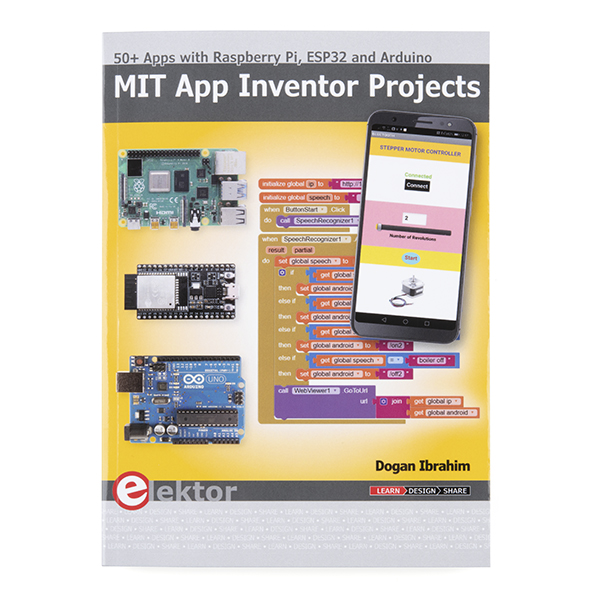The Elektor MIT App Inventor Bundle is a kit built to help learn about developing apps for Android compatible mobile devices using the MIT App Inventor online development environment. MIT App Inventor projects can be in either standalone mode or use an external processor. In standalone mode, the developed application runs only on the mobile device (e.g. Android). In external processor-based applications, the mobile device communicates with an external microcontroller-based processor, such as Raspberry Pi, Arduino, ESP8266, ESP32, etc.
The kit comes with a book and a selection of parts that correspond with a number of projects. Check out the features and Includes tab for more information.
- MIT App Inventor Book
- Elektor MIT App Inventor Starter Kit
- 4x LED
- 4x 470 Ohm resistor
- 1x 330 Ohm resistor
- 1x 1K resistor
- 1x 2K resistor
- 1x 100 Ohm resistor
- 1x DC motor (small)
- 1x DHT11 sensor
- 1x 1N4148 diode (small)
- 1x 4-way relay module
- 1x HC-06 Bluetooth module
- 1x Parallel LCD 16x2 monochrome
- 1x I²C LCD
- 1x LM35DZ sensor chip
- 1x Small stepper motor (28BYJ-48)
- 1x Stepper motor driver board (ULN2003)
- 1x ESP-01 processor
- 1x NPN transistor BC547
- 6x F-M jumper wires
- 6x M-M jumper wires
- 1x Breadboard (small)
- Projects Include:
- Using the text-to-speech component
- Intonating a received SMS message
- Sending SMS messages
- Making telephone calls using a contacts list
- Using the GPS and Pin-pointing our location on a map
- Speech recognition and speech translation to another language
- Controlling multiple relays by speech commands
- Projects for the Raspberry Pi, ESP32 and Arduino using Bluetooth and Wi-Fi
- MIT APP Inventor and Node-RED projects for the Raspberry Pi
Elektor MIT App Inventor Bundle Product Help and Resources
Core Skill: Soldering
This skill defines how difficult the soldering is on a particular product. It might be a couple simple solder joints, or require special reflow tools.
Skill Level: Rookie - The number of pins increases, and you will have to determine polarity of components and some of the components might be a bit trickier or close together. You might need solder wick or flux.
See all skill levels
Core Skill: Programming
If a board needs code or communicates somehow, you're going to need to know how to program or interface with it. The programming skill is all about communication and code.
Skill Level: Competent - The toolchain for programming is a bit more complex and will examples may not be explicitly provided for you. You will be required to have a fundamental knowledge of programming and be required to provide your own code. You may need to modify existing libraries or code to work with your specific hardware. Sensor and hardware interfaces will be SPI or I2C.
See all skill levels
Core Skill: Electrical Prototyping
If it requires power, you need to know how much, what all the pins do, and how to hook it up. You may need to reference datasheets, schematics, and know the ins and outs of electronics.
Skill Level: Competent - You will be required to reference a datasheet or schematic to know how to use a component. Your knowledge of a datasheet will only require basic features like power requirements, pinouts, or communications type. Also, you may need a power supply that?s greater than 12V or more than 1A worth of current.
See all skill levels
Comments
Looking for answers to technical questions?
We welcome your comments and suggestions below. However, if you are looking for solutions to technical questions please see our Technical Assistance page.
Customer Reviews
No reviews yet.



